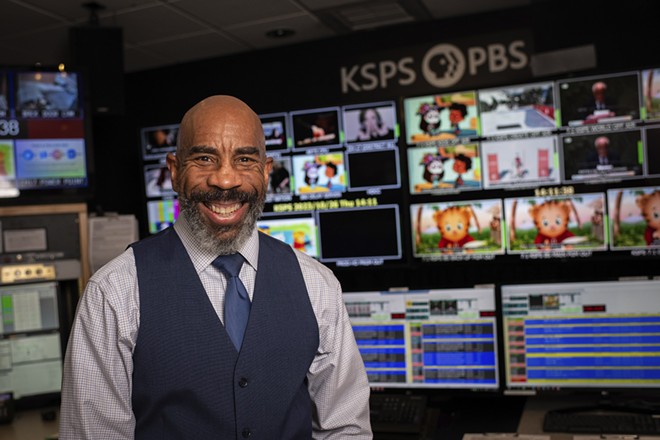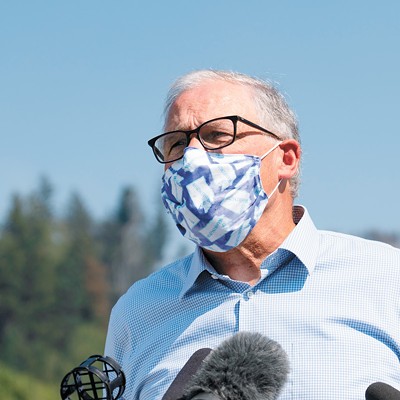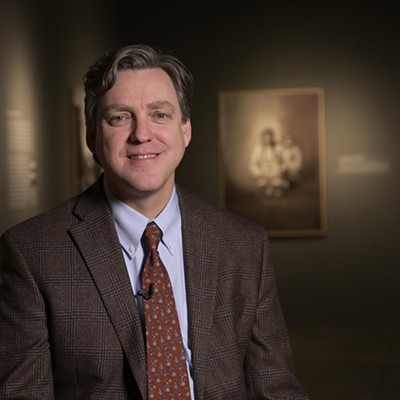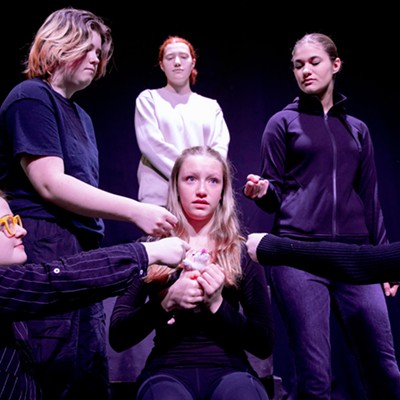When Gary Stokes moved to the Inland Northwest to accept a job in 2011, he thought it'd just be another stop in his career. He'd worked across the country, usually spending about three years in a position. Now he's celebrating his 12th year in Spokane.
"Most of my family has resigned themselves to the fact that there's a good chance that I'm going to be here forever," he says. "This is a place that grows on you."
It took time for Stokes to settle in though. Shortly after starting as the executive director of Friends of KSPS — the fundraising organization behind KSPS Public Television — he was faced with a crisis.
At the time, the station was run by Spokane Public Schools. However, in 2012, school board directors and Friends of KSPS decided it was time for the school system to get out of the television business.
That decision saw Stokes spend the next year transitioning from solely fundraising to running the entire station.
"I'd been here a whole year and had to learn a whole lot about a whole lot of people all at once," he says.
They were under a strict deadline: If they didn't get the station licenses transferred by Aug. 31, 2013, he says they wouldn't have been able to move forward at all. Like any experienced journalist, he cut it as close to the deadline as possible by having the licenses finally transferred the afternoon of Aug. 31.
He then transitioned into a role as the KSPS president and general manager.
A Philadelphia native, Stokes graduated with a bachelor's in criminal justice from the University of Dayton in 1978. He moved around the Midwest and East Coast as he worked his way up in broadcasting. Before moving to the west side of the country, he recorded journalism jobs at stations in Texas, Ohio, New York, Alabama, Virginia and Washington, D.C., often working in management roles after about 1996.
The shift in leadership, however, was only the first hurdle in his tenure at KSPS. After the dust had settled, Stokes had to contend with an industry exploding with competition.
"Back in the day, when I was a wee lad, we had three television channels," he recalls. "Now there are 300 plus. Anybody can now curate their own viewing guide."
This doesn't even begin to take into account the overwhelming uptick in streaming services in the past decade.
"People watch us because they want information. They want to feel better when they're done," Stokes explains. "I've been fortunate enough to work in the PBS system long enough that I look at where we are now compared to where we used to be, and we are more valuable than ever given the fractious nature of what's going on in television right now."
That's why about five years ago Stokes sat down with his team to brainstorm how they could best move forward. The answer — simplifying their efforts to focus on the four key pillars of the station without losing their mission of enriching the communities they serve.
...we are more valuable than ever given the fractious nature of what's going on in television right now.
tweet this
FOUR PILLARS
Arts and culture. Education. Civic health. Workforce development.
Everything that Stokes oversees at the station fits under one of those four categories. And with a coverage area that comprises Eastern Washington, North Idaho, Western Montana, a chunk of Oregon and most of the Canadian province Alberta, he says it's imperative to provide programming that all can enjoy.
"Our Canadian friends care just as much about what we do, and why we do it, as our friends right here in Eastern Washington," he says. "That's why our donor base is so important to us. We are serving so many different organizations and factions out there."
Since the KSPS team simplified its mission into four easily identifiable categories, Stokes says they were able to take the COVID-19 pandemic head on.
When pandemic lockdowns shuttered most performance venues, musicians had nowhere to go. Because of this, KSPS began producing Inland Sessions — a program meant to showcase musical talent across the Inland Northwest.
Even with venues open again across the country, the station has continued filming the program to elevate local musicians to platforms wider than any venue's stage.
Education and workforce development were a bit easier to address, Stokes says. After a four-year search, he hired an education director. KSPS has since built a program called Career Explorer Northwest. The simple model showed folks doing a specific job and guiding viewers to more information on the job. Because of this, Stokes says they've exhibited well over 100 jobs.
Addressing civic health, however, took more time and consideration. Ultimately, a Civics Bowl for teams of high school students was born. "It just lights me up," Stokes says, noting it is the most fun he's had on the job in a long time. Had he been able to participate in a civics bowl as a kid, "I would have been right there," he says.
FREEFALLING INTO THE FUTURE
After years of service to the communities he's lived in, the 66-year-old doesn't see an end in sight any time soon.
"I have no real plans to go anywhere unless the perfect job comes up," Stokes says. "And right now, I think I already have it."
It's not just his work life that has excited him lately, his personal life has taken a turn for the extreme — in a good way.
On his 65th birthday Stokes plummeted to the earth in a death-defying stunt after hopping out of a plane thousands of feet in the air. Connected to another person who he says would soon become one of his closest friends, Stokes had fulfilled his goal of skydiving. He then went again for his 66th birthday, cementing the activity into tradition.
Someday he hopes to take a solo one-way ticket to the planet's surface, but for now, he must jump in tandem with an experienced partner.
Not all of his goals include jumping out of a plane though. Before his 66th birthday, he ran six half-marathons (and another third of a marathon) all in under three hours. Again, cutting it to the wire, Stokes says he finished one of the races with four seconds to spare.
Stokes says he's done running these races now, but he's got plenty of personal and work goals for the next few years — none that he would disclose though.
"There are still some plans that we have here that are not yet realized," he says. "And I'm hoping by the time I retire, we'll be in a position to take us to the next level."
























